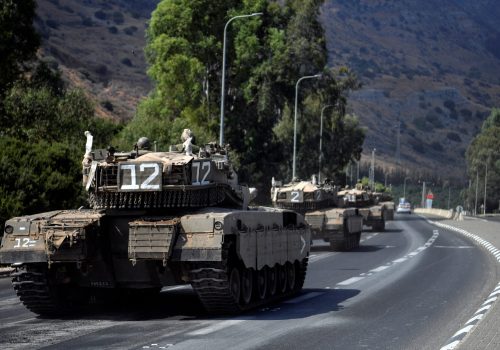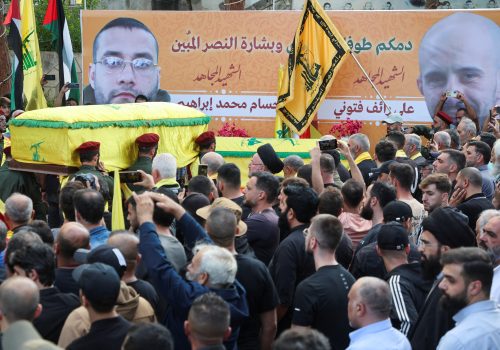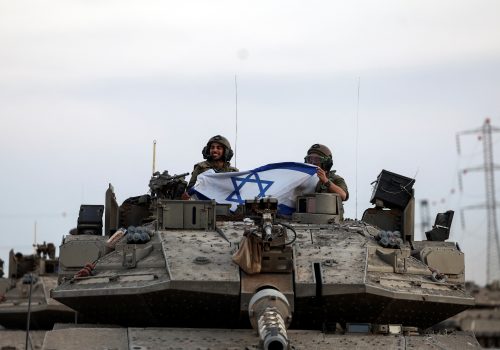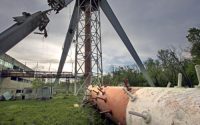It doesn’t matter whether Iran planned the Hamas attack—Tehran is still to blame
Whether or not Iran helped plan Hamas’s terrorist attack that killed at least 1,300 Israelis is needlessly distracting analysts and the media from the far more important conclusion that we already know: Iran is culpable for the attack.
On Monday, Washington was set abuzz when the Wall Street Journal published a story claiming that Iran helped Hamas plan this past weekend’s mass terrorist attack against Israel. Amwaj.media—a relatively new outfit focused on Iran, Iraq, and the Gulf—posted a competing story shortly afterward in which Iranian officials insisted they were not involved with the operation at all. The Washington Post added to the dialogue by concluding that Iran’s role is not clear. And the New York Times on Wednesday reported that Iran was surprised by the attack.
Implicit in the ongoing debate about what role Iran played in helping Hamas prepare for these attacks is a belief that reaching a definitive answer will inform or alter the decision making and next steps by Israel, the United States, and other allies. But the premise is false.
Iran’s involvement (or lack thereof) in the terrorist attack planning should not change anyone’s view that Tehran is culpable for the attack.
Iran’s confirmed participation in the planning would be unlikely to change the size and scale of Jerusalem’s air campaign that has already started. Nor would it alter the ground operation Israel is almost certain to launch in the coming days to degrade Hamas’s capabilities and eliminate those most responsible for the operation. It would not change how Israel will respond if Hezbollah opens a new front from the north or Palestinian militants attack from the West Bank. And Israel’s shadow war with Iran will continue regardless.
In the United States, President Joe Biden has moved repeatedly to highlight his support of Israel and to condemn in the harshest terms Hamas’s terrorist attack. And he has backed up words with deeds, moving the USS Gerald R. Ford carrier strike group closer to Israel—a surefire warning to Hezbollah not to open a new front in the north, or risk being attacked by the United States—and reportedly freezing the six billion dollars Iran was supposed to receive via Qatar in exchange for the US hostages released from Iran last month.
None of these steps would likely change if hard evidence had emerged to confirm—or refute—the notion that Iran directly helped Hamas plan the attack. What could have changed US and Israeli reactions to date and those to come? Tehran almost certainly recognizes that if its Quds Force—a branch of the Iranian Islamic Revolutionary Guards Corps that is broadly analogous to US special forces—had taken part directly in the attacks, it would change the reaction. An equally impactful alternative escalation would have been if Quds Force Chief Esmail Qaani had provided more advanced ballistic missile systems to Hamas, as he has to Hezbollah. But helping to plan the attack, or not, isn’t at that level.
For years, Iran has provided Hamas the overwhelming majority of its funding, weapons, and training—all of which were leveraged for this attack.
Moreover, while having clarity on whether Iran was truly surprised by the attack is important to help analysts understand the amount of operational independence Hamas does or does not have for decision-making, Iran’s involvement (or lack thereof) in the terrorist attack planning should not change anyone’s view that Tehran is culpable for the attack.
For years, Iran has provided Hamas the overwhelming majority of its funding, weapons, and training—all of which were leveraged for this attack. In doing so, Iran ensures that it holds an equal share of responsibility for the success of the attack and for all deaths, injuries, and kidnappings of Israelis and foreign nationals. Whether it helped in the planning, gave a direct order for the attack to happen, or didn’t know it was going to happen is largely irrelevant.
Hamas and Iran are not ideologically sympatico. The prior is a Sunni Palestinian movement; the latter, the world’s most populous and prominent Shia country. What they have in common is not religious views but a hatred of Israel that manifests itself quite literally, for both Hamas and Iran, in a desire to see the cessation of its existence. The relationship may have strategic overtones, but at its core it is a transactional relationship—unlike that of Iran and Hezbollah, a Shia organization that has pledged fealty to Iran’s supreme leader. Iran provides Hamas with money, weapons, and training; the expectation is that it will use them, directly or indirectly, to fight Israel.
The public may eventually learn a conclusive answer as to whether or not Iran helped plan the terrorist attack on Saturday. But the world already knows what matters most: Iran shares responsibility for it.
Jonathan Panikoff is the director of the Scowcroft Middle East Security Initiative in the Middle East Programs He is a former deputy national intelligence officer for the Near East at the US National Intelligence Council.
The views expressed in this publication are the author’s and do not imply endorsement by the Office of the Director of National Intelligence, the Intelligence Community, or any other US government agency.
Further reading
Sun, Oct 8, 2023
Dispatch from Jerusalem: How does this end?
New Atlanticist By William F. Wechsler
Israel must not make the same mistakes that the United States made after 9/11. Here are some critical questions to ask now.
Tue, Oct 10, 2023
What will Hezbollah do next? Here’s how the Hamas-Israel conflict could engulf the region.
New Atlanticist By Nicholas Blanford
Neither Israel nor Hezbollah appears to want an escalation, but the risks are high for a disastrous miscalculation.
Tue, Oct 10, 2023
Live expertise: Get the latest insight on the Israel-Hamas war
New Atlanticist By Atlantic Council experts
Atlantic Council experts are analyzing the rapidly unfolding events in the Middle East as they happen. Find the latest here.
Image: Iran’s Supreme Leader Ayatollah Ali Khamenei reviews armed forces during a graduation ceremony for armed forces officers at the Imam Ali academy in Tehran, Iran October 10, 2023.



